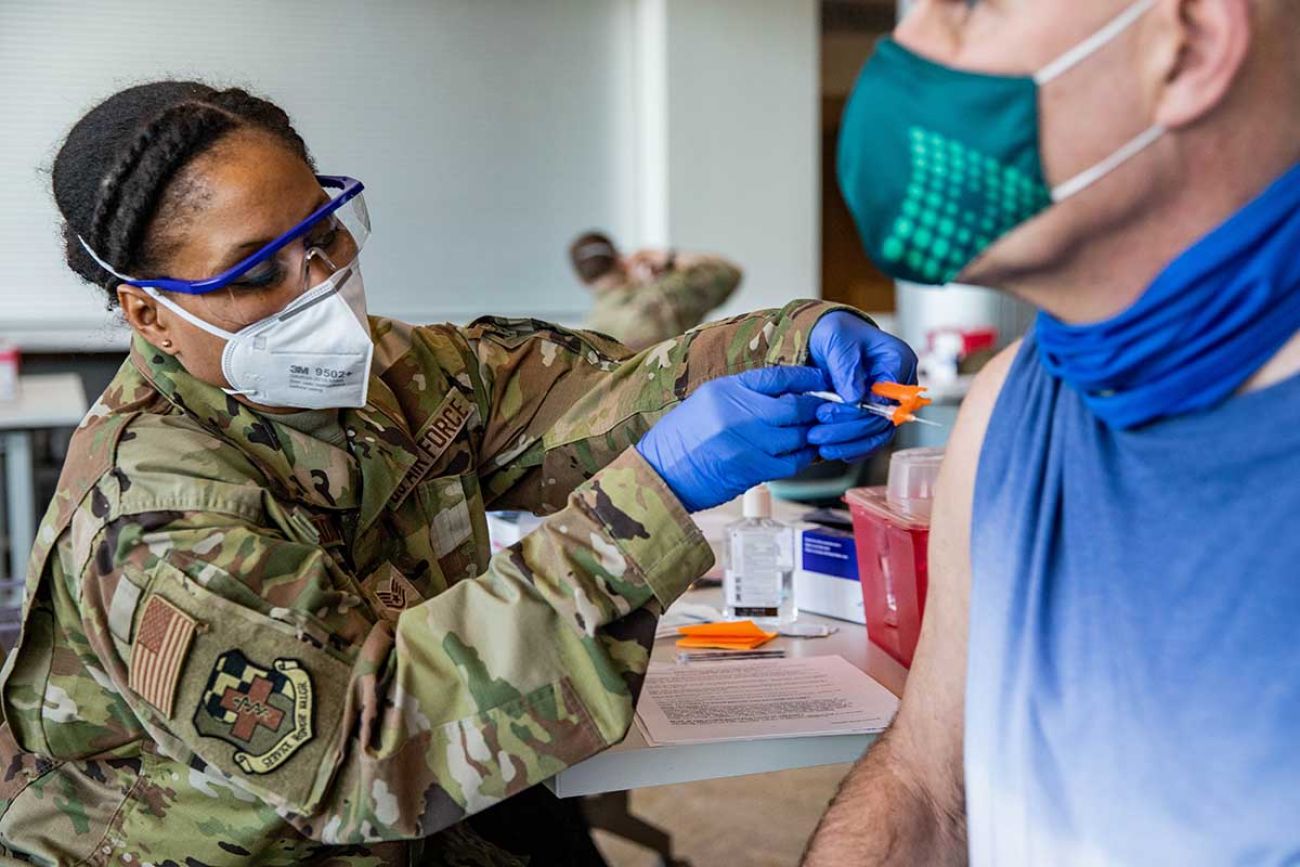As COVID rises, CDC approves boosters for all adults, Michigan urges masks

The U.S. Centers for Disease Control and Prevention late Friday approved COVID boosters for all adults, days before millions of Americans are expected to travel for gatherings leading up to the Thanksgiving holiday.
A CDC expert advisory panel Friday unanimously endorsed broad adult eligibility for either the Pfizer or Moderna boosters once six months have elapsed since recipients finished the two-dose vaccines. Final approval came Friday evening, when CDC director Rochelle Walensky signed off on the recommendations to provide increased protection against the deadly virus.
Related stories:
- 'Are you vaccinated?' and other new Thanksgiving traditions in Michigan
- Hospitals filling up as Michigan records highest COVID case rate in U.S.
- 5 million Michiganders are vaccinated and COVID is surging. Here’s why
- Child COVID vaccines are available in Michigan. Now comes the hard part.
Meanwhile, as COVID-19 cases surge across Michigan, the state Department of Health and Human Services issued an advisory Friday urging residents to wear masks as they gather for the holidays or head toward holiday shopping and other business, even if they’re vaccinated. The recommendation essentially formalizes the agency’s long standing advice, but unlike far stricter state policies a year ago, carries no mandate.
The federal actions Friday open up boosters to millions more Americans age 18 or older, including those otherwise healthy. Already, people who were immunocompromised, 65 and older, living in long-term care settings or otherwise at higher risk were eligible to receive third doses or COVID boosters.
These higher-risk groups were also eligible for a booster of the one-dose Johnson & Johnson vaccine. The CDC has not yet signed off on making the J and J boosters broadly available to adults. But last month, the CDC endorsed a mix-and-match approach to boosters, allowing those who initially were vaccinated with J & J to seek a Moderna or Pfizer booster.
In Michigan, more than 1.2 million doses of the vaccines already have been administered as “additional doses” for immunocompromised people or as boosters for others, according to state data.
"Booster shots have demonstrated the ability to safely increase people's protection against infection and severe outcomes and are an important public health tool to strengthen our defenses against the virus as we enter the winter holidays," Walensky said in a statement.
According to data compiled by the CDC in September, all three U.S.-approved COVID vaccines help prevent hospitalizations. The Moderna vaccine was shown to be 93 percent effective against hospitalizations from March 11 to August 15 compared to the Pfizer vaccine (88 percent) and the J & J vaccine (71 percent).
It remains to be seen how much broad booster availability will help tamp down infections in Michigan, which currently has one of the highest infection rates in the nation. Roughly 40 percent of Michigan residents haven’t received a single dose.
“The fact is, we are not going to boost our way out of this pandemic,” said Dr. Russell Faust, medical director at the Oakland County Health Division.
“It's great that people are getting boosters because it will keep them safe. It decreases the likelihood of them getting infected with COVID-19, and even if they do have a breakthrough infection, it will (be more likely to) keep them out of the hospital and keep them alive. That's all good. I fully support that,” he said. “But the fact is, we need to get everybody vaccinated.”
There’s not enough data yet to definitely say how quickly protection wanes from initial vaccines, nor precisely how much boosters will protect long-term or how often they’ll be needed.
But their safety seems clear, said Dr. Srikar Reddy, president of the Michigan Academy of Family Physicians. He and his sons had COVID in December. They were moderate cases, but he doesn’t want to tempt fate.
“What I do know is that, when I look at the risks and benefits, there’s not a whole lot of risk with getting the booster,” Reddy said.

Dr. Teena Chopra, an infectious disease doctor and professor at Wayne State University, said there is mounting anecdotal evidence of waning immunity among those who were fully vaccinated earlier this year. She was among the first doctors in the state to care for the sickest patients, as metro Detroit was overwhelmed in the spring of 2020 in the early days of the pandemic. The first vaccines were first made broadly available to higher-risks groups in January of this year.
“We are now starting to see people who have gone eight months or more since being vaccinated, they’re not boosted, and they are getting hospitalized,” Chopra said.
With boosters about to become widely available to adults, the good news is that those seeking them should not have much trouble.
In Oakland County, more than 185,000 boosters or third doses have been administered — “a good, steady flow,” said Faust — since August, when immunocompromised people were first eligible for an additional dose.
Michiganders will simply need to call a local vaccine provider — a vaccination clinic, physician’s office, hospital or health department — and schedule an appointment, or follow this link here to find nearby providers.)
Masks and flu shots
In Lansing Friday, the health department recommended that anyone 2 years old and older wear a face mask at indoor gatherings regardless of their vaccination status. Businesses should require masks of customers and employees, MDHHS leaders said during a morning news conference, though the state declined to mandate such actions.
It’s another move to help “curb” the steep upward curve of COVID, said Elizabeth Hertel, MDHHS director.
The state stopped short of requiring masks as it has for most of the past year, essentially formalizing existing advice and leaving it up to individual choice. That masking, experts have said, nearly zeroed out the spread of last year’s flu and respiratory viruses.
“We've all been armed with the information that we think we need to have in order to keep people safe,” said Hertel, the MDHHS director.
“So at this point, we feel that it is most prudent to make sure that people are aware of how serious this COVID surge is right now and give them the ability, the information to take steps to protect themselves and others,” she said.
Whether the advice will change anyone’s practices is unclear.
The state’s mask recommendation is “valid” in that masks prevent spread — and that’s especially true in schools, for example, said Reddy, president of the family doctor’s group.
But whether fully vaccinated family members should mask when they gather around the Thanksgiving table — that’s a different risk calculus than a family with a mix of unvaccinated members and those at higher risk, said Reddy.
“The fact of the matter is, if you have multiple vaccinated individuals, they understand their exposure. It’s really a family decision,” he said.
Others see a reality that’s even more blunt and grim.
Those who refuse masks and vaccines “can't be convinced regardless of how much information you get them, how many facts you present to them...They are dead set in their beliefs,” said Faust of Oakland County.
The Whitmer administration also stepped up its call for masks and for flu shots, as the state begins to see what some experts say could be a rough flu season ahead.
See what new members are saying about why they donated to Bridge Michigan:
- “In order for this information to be accurate and unbiased it must be underwritten by its readers, not by special interests.” - Larry S.
- “Not many other media sources report on the topics Bridge does.” - Susan B.
- “Your journalism is outstanding and rare these days.” - Mark S.
If you want to ensure the future of nonpartisan, nonprofit Michigan journalism, please become a member today. You, too, will be asked why you donated and maybe we'll feature your quote next time!








